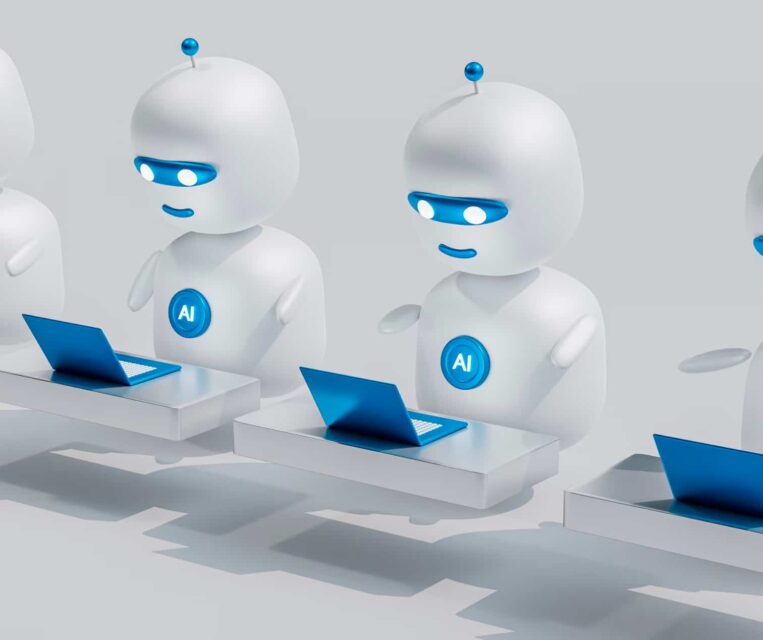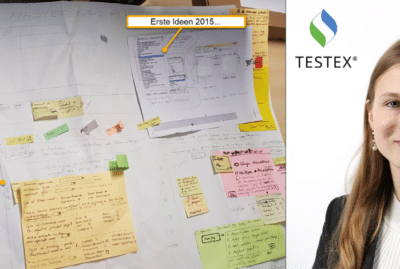No one can ignore it anymore: generative artificial intelligence (AI) has been shaping our everyday lives since the release of ChatGPT in November 2022 at the latest. Other AI generators and image editing programmes quickly followed. Unsurprisingly, AI is once again at the top of Gartner’s “Top 10 Strategic Technology Trends for 2024”. This time, however, the focus is on “trust, risk and security management”. Are experts increasingly worried about the future of artificial intelligence? Is it true that the AI hype will diminish in the future? And what significance does AI development have for Swiss companies?
Artificial intelligence - hype or chance?

What is artificial intelligence?
Before we look at the future of AI, we first need to define this term. Generative Artificial Intelligence refers to the attempt to create human-like intelligence in computer systems and applications. The aim is for machines to learn to solve problems independently, make decisions and constantly learn – similar to the way humans do (deep learning). This includes skills such as perceiving and reacting to sensory impressions, generating images, recording and processing information, storing knowledge, understanding and generating language and solving problems.
The new generation of AI algorithms is revolutionising the way we process information and develop innovative solutions to complex problems. On top of this, AI systems can process and analyse huge amounts of data (big data), unlike traditional IT programs. However, artificial intelligence can do even more – in addition to its generative capabilities, possible applications also include machine learning, predictive analytics, robotics, process automation, personalised recommendation systems, medical diagnoses and financial analysis. In industry, AI is increasingly being used to optimise production processes and develop innovative products. In healthcare, it is helping to recognise illnesses earlier and create individual treatment plans. As development progresses, the potential applications of AI are expected to increase even further and transform numerous areas of everyday life.
The importance of AI for companies
Switzerland stands out as an innovation leader and is considered an important centre for financial services, pharmaceuticals, science and high technology. The integration of artificial intelligence in these sectors promises an increase in efficiency, the development of innovative solutions and progress in research. Thanks to its outstanding education and research infrastructure, companies in Switzerland can play a pioneering role in the development of AI technologies and applications. It is a crucial step for the economy to invest in AI research, education and innovation in order to make the most of the many opportunities offered by this transformative technology.
AI is most commonly used by companies involved in manufacturing and the provision of services. AI is also used by companies to automate processes, analyse data and communicate with their customers. The ongoing development of artificial intelligence (AI) harbours considerable potential for companies to increase their efficiency. AI can offer significant advantages thanks to its ability to quickly search and organise large amounts of data and make it usable in the long term. It also enables fast and personalised customer communication as well as precise predictions about potential customer purchases online.
According to a recent study by Cisco (a US company from the telecommunications industry), 92% of Swiss companies with at least 500 employees have an AI strategy or are currently in the process of developing one. In addition, 45% of Swiss companies felt under pressure to act within the next twelve months, as otherwise there would be serious consequences for their business. The “AI hype” has not bypassed Swiss companies either. However, the study also showed that the infrastructure in Switzerland is not yet prepared for implementation. According to Cisco, 71% of respondents are unable to introduce new AI-based processes in companies due to a lack of scalability.
Unleash your AI potential with our customised consulting package!
soxes offers you ONE-to-ONE consulting tailored to your needs, focussing on the individual opportunities and possibilities of your company.
We show you exciting possibilities and helpful solutions. Quickly, simply and competently.

How your company benefits from artificial intelligence
The importance of Artificial Intelligence (AI) for companies spans across various sectors and industries and has a significant impact on the business world. Here are the key reasons why AI matters to your organisation:
- Increased efficiency: AI technologies enable companies to optimise their operations and make them more efficient. Automation of repeatable tasks, process optimisation and data-driven decision-making help to save resources and increase productivity.
- Data evaluation and use: AI enables companies to analyse large volumes of data and gain valuable insights from it. Through machine learning, patterns, trends and predictions can be discovered from complex amounts of data, leading to well-founded decisions and strategic planning.
- Customer interaction: Artificial intelligence is increasingly being integrated into customer service and communication. Chatbots and virtual assistants can process customer enquiries quickly and efficiently, be available around the clock and improve customer satisfaction.
- HR management: AI can be used in human resources to improve the selection process for applicants, adapt training programmes and analyse employee performance.
- Promoting innovation: Artificial intelligence can also serve as a tool for promoting innovation. By automatically generating ideas, identifying market trends and predicting customer needs, companies can react more agilely to changing market conditions.
- Security: AI plays a crucial role in recognising security threats and preventing cyber attacks. By using machine learning, companies can better protect their IT infrastructures and respond to potential risks.
- Product and service innovation: AI-based technologies enable companies to develop innovative products and services. Examples include personalised recommendation systems, intelligent products or robots and automated production processes.
- Market leadership: Companies that use artificial intelligence effectively can gain a competitive advantage. The ability to use data to make informed decisions and offer innovative solutions helps to position themselves as industry leaders.
What doubts are there about AI?
Many companies have mixed feelings about artificial intelligence (AI). Although they recognise the benefits of this technology, they also have reservations. Companies fear that they will become too dependent on this technology and have uncertainties about the skills required and the potential impact on their business processes. Concerns about misinformation, changing customer relationships and data protection are increasing the reservations about the integration of artificial intelligence in many companies. This also includes doubts about the long-term financial impact of AI integration. Many companies are not yet aware of the extent to which artificial intelligence will impact their organisation.
AI - just hype or a game changer?
Artificial intelligence is no longer a future scenario, but has already established itself in many areas of life and will remain an integral part of our reality. Although it will still be a while before artificial intelligence reaches the level of human capabilities, development in this area will continue to grow. The challenge is to equip artificial intelligence not only with rational, but also with emotional and creative aspects. Even if it is uncertain whether this will ever be completely successful, we should not be too quick to rule out this possibility.
The future of AI will undoubtedly be characterised by increased use in various industries and in everyday life. It makes our lives easier in many ways and is available as a supporting element. An important point is that artificial intelligence not only replaces jobs, but also creates new ones, as maintenance and further development require human involvement. In the current situation, many see artificial intelligence as an opportunity rather than a risk. The everyday use of AI, particularly through programmes such as ChatGPT, makes it clear that it already has a firm place in our lives and will continue to find a wide range of applications in the future.
The importance of AI for companies is expected to increase further as technologies continue to develop and new fields of application are opened up. Companies that recognise these developments early on and strategically integrate artificial intelligence into their business models can achieve long-term competitive advantages. Artificial intelligence is no longer just seen as a “nice to have”, but is crucial for the future of the company.
However, despite the clear benefits of such “intelligent systems”, it is important to keep an eye on potential risks. Sensible regulation by the government plays a crucial role in ensuring that AI is used responsibly without jeopardising daily life. The careful balance between use and caution therefore remains crucial in order to maximise the positive potential of AI technology while minimising possible risks. Because we will be asking ourselves the question (much sooner than we hope): Is it real or generated by AI?
This article was not written with the help of ChatGPT or other artificial intelligence!
Contact
Do you have any questions? Would you like to find out more about our services?
We look forward to your enquiry.
Contact us




































































